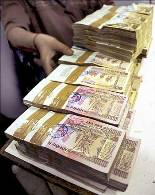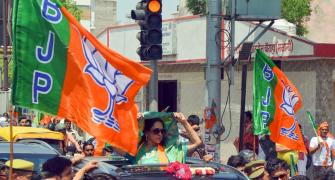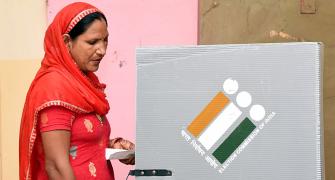 Following the 11.4 per cent decline in the dollar value of the rupee over barely a quarter, the sharp slump of last week has further complicated an already tricky situation for the Reserve Bank of India (RBI).
Following the 11.4 per cent decline in the dollar value of the rupee over barely a quarter, the sharp slump of last week has further complicated an already tricky situation for the Reserve Bank of India (RBI). Not surprisingly, RBI Deputy Governor Subir Gokarn has expressed "concern" about the sharp depreciation within "such a short period of time". It is hard to predict what the ramifications will be, given that the depreciation has varying implications for different economic actors.
While RBI has been slow to intervene in the foreign exchange market, and it had reasons for being slow, it may have no option but to act with greater alacrity in days to come.
The depreciation in the dollar value of the rupee is evidently owing to foreign capital seeking a safe haven in the US dollar, in response to the volatility currently roiling global financial markets, especially the euro area.
The immediate concern is whether delayed intervention by RBI would lead to a surge in "imported" inflation. If so, how would RBI respond? Raising interest rates has not proved effective so far and another round of interest rate hike will dampen business sentiment further.
Since RBI has the required foreign exchange reserves, should it intervene more forcefully to pull the rupee up a bit?
The jury is out on that question. On a positive note, it is likely that capital flows would reverse direction once volatility settles resulting in investors returning to emerging markets such as India, to leverage interest rate differentials between developed and emerging markets, in a replay of what happened two years ago.
The rupee's depreciation is, ceteris paribus, likely to benefit domestic exports, currently enjoying an unprecedented boom.
It could potentially provide a shot in the
arm to the software sector, which is currently languishing owing to deflated demand in the West.
However, this optimism needs to be tempered given that economic conditions in India's leading export markets the United States, the euro zone and Japan are unlikely to improve anytime soon!
On the other hand, importers across the board will be adversely impacted. It is unfortunate that developments on the foreign exchange front have not enabled India to fully leverage the fall in commodity prices, particularly oil.
Thus, any gains from a fall in commodity prices will be largely neutralised because India will have to pay more for the dollar at least in the short run. The same applies to imports of copper, nickel and other non-ferrous metals that India has been importing in significant amounts.
In the case of coal, India is faced with the double whammy of escalating prices and a falling rupee. All things considered, India's trade deficit is likely to widen, at least in the short term.
India may be able to absorb these outflows into its current account deficit, which has been declining in recent quarters as a result of higher export earnings and remittances. However, alarm bells would start ringing as the current account-to-GDP ratio moves towards four per cent.
It is difficult to hedge one's bets on the duration of the current situation. If the previous episode of global volatility in 2008-09 is any indicator, the reversal of capital flows could take place just as suddenly.
RBI would then be faced with the unedifying prospect of handling unbridled capital flows, which comes with its own set of problems.
The dominant policy challenge for India remains finding the most efficient way to regain a high growth trajectory at the earliest.
While it is impossible to remain impervious to external influences, the key to sustained growth lies in unleashing domestic productive capacities.








